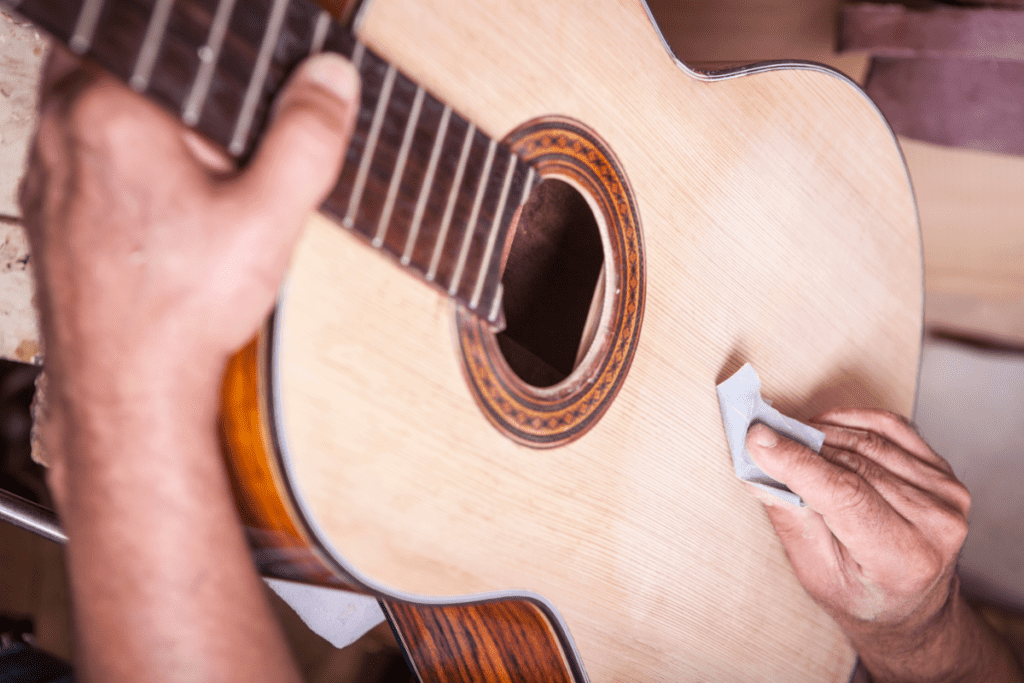Both acoustic and electric guitar finishes have evolved along with the instruments, so your guitar will have one of several types of finishes used over the years. Instrument craftsmen first used available materials, such as the egg whites applied to Renaissance lutes, or the secret recipes of aromatic resins used by violin builders in the time of Stradivarius. More recently, modern chemistry has created synthetic products that have become industry standards for guitar finishing.
So whether you own a vintage instrument or a modern one, you’ll want to properly match cleaning and polishing products to the finish on your guitar and include them as part of your guitar accessories.
Follow Finishing Through the Ages
Wood finishing as we know it began with organic substances, such as Tung and Linseed oil and waxes derived from plants. These gave a thin coating but didn’t offer the surface protection that instrument makers wanted, so more substantial ingredients were sought.
By the mid-19th century, varnish manufacturing had developed, and a burgeoning knowledge about chemistry was being applied to oils and resins. These finishes found their way onto instruments such as guitars and pianos and were generally very durable and aesthetically pleasing.
Later on, 20th-century advances in petroleum research led to quick-drying lacquer finishes, which were popular with manufacturers mass-producing instruments during that time but were brittle, temperature-sensitive, and prone to cracking. Nitrocellulose lacquer became a popular finish that gave the desirable, sound-enhancing thin coating along with quick drying time which allowed increased instrument production. Newer lacquer-based coatings have been developed that are more durable and quickly cured with UV light.
More recently, enamel varnishes and acrylics, as well as polyester and polyurethane, are used as a stronger, although heavier, finish for guitars. These finishing products are more adaptable to the factory production of instruments.
Some custom guitar builders prefer an oil finish applied over polished wood to foster the most resonant overtones, even at the cost of protecting the wood’s surface, so for them, guitar finishing techniques have come full circle.

Consider Guitar Polish Formulations
There’s a variety of guitar polish formulations and combination packages of both cleaner and polish. Virtuoso Premium Cleaner and Polish is an example of this two-part system created specifically for nitrocellulose lacquer finishes.
Some, such as Pro Formula by Smith are a mild combination of natural oils and water. They contain no abrasives or oily products and are considered good for general usage on lacquer and other finishes.
Water-based creamy cleaners or polishes, such as Planet Waves Restore, usually contain a mild abrasive to cut through surface dirt. and a glossing agent, such as Carnauba wax to add shine and protection.
Oil-based polish is best used for instruments having an oil finish or unbroken lacquer or synthetic finish, not older acoustic or electric guitars, as the oils can penetrate into the instrument’s wood through any cracks or exposed surfaces.
Clean and Polish Properly
A wipe with a soft cloth or one moistened with a spritz of clean water is all that’s necessary for regular cleaning, as Frank Ford points out in his article, Clean up your Axe, on the frets.com website. He stresses how wiping your guitar with a soft cloth each time you finish playing it can help it to look good and feel better.
It’s highly recommended that cleaning and polishing products be used sparingly and only as needed for removing accumulated grime and residue that comes from playing your guitar.
Make sure any cloth you use for cleaning and polishing is soft and lint-free. Besides commercially manufactured polishing cloths, old, clean, and plain Cotton T-shirts are excellent for this. Be careful of any silk screening on them, as that can scratch a guitar’s finish.
Check the instrument manufacturer’s information on specific polishing products for your guitar. They get regular feedback from players and luthiers working with their instruments.
Things to avoid using are paper towels and any polish containing silicon, as this degrades lacquer finishes. Remember, guitars are like people; a little care goes a long way.
who knew that there’s so much to guitar maintenance 🙂
I used the wrong polish on my first guitar… It took me a of time to fix it.